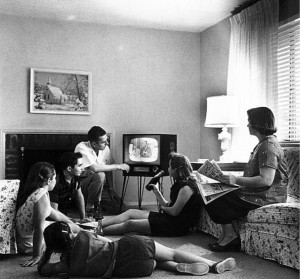 Film is to novel what television is to…?
Film is to novel what television is to…?
Okay, sorry for the bad SAT’s flashback. Your chances of getting into Harvard were ruined a long time ago (blame television or your parents, not me.) But seriously, I’ve been thinking a lot about this question.
The golden age of film has long been dead. Television has taken over as the true innovator of the visual story. We could all name our favorite examples of television shows over the last twenty years that have evolved the way we communicate, think and tell story. I won’t even start trying to make a list.
It has also been well established that film/movies often rely on novels as the basis of their story arcs. It is true that technically novels are difficult to crunch down into a few hours worth of movie, but feature films and novels both commonly endeavor to use the same sort of classic story arc–telling an entire story with a beginning, middle and end.
Sure, a television show must also have a sort of mini-arc with it’s own beginning, middle and end. These are often quite formulaic (CSI, Law and Order, X-Files, etc.) But television also has the larger seasonal and series arcs to play around with. Characters have several hours worth of opportunity to develop, change, grow, die and be born. Plots and subplots can appear, dive beneath the surface and reappear episodes later. Often times a television show can focus on a larger universe than a feature film.
Within the written word, what format of story-telling best matches the television format? And with the decline of film and rise of television will the novel step aside as well?

 I’ve tracked www.Kobobooks.com for several weeks now, keeping my eye on the following things:
I’ve tracked www.Kobobooks.com for several weeks now, keeping my eye on the following things: